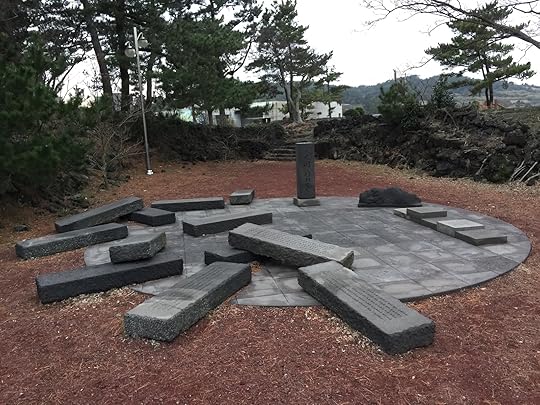What do you think?
Rate this book


272 pages, Hardcover
First published September 9, 2021
I remembered... everyone who's ever suffered similar fates regardless of place...
Hit with bullets.
Hit with cudgels.
Lives severed by blades.
How agonizing it must have been
‘That is how death avoided me. Like an asteroid thought to be on a collision course avoids Earth by a hair’s breadth, hurtling past at a furious velocity that knows neither regret nor hesitation. I had not reconciled with life, but I had to resume living.’
‘It was early November and the tall maple trees were ablaze and glimmering in the sunlight. Beauty—but the wiring inside me that would sense beauty was dead or failing. One morning, the first frost of the season covered the half-frozen earth—Brittle autumn leaves as big as young faces tumbled past me, and the limbs of the suddenly denuded plane trees, as their Korean name of buhzeum—flaking skin—suggests, resembled grey-white flesh stripped raw.’
‘—in the areas where the conifers and subtropical broadleaf trees grew together, the wind created an indescribable harmony as it passed through the branches and leaves, its speed and rhythm varying by the type of tree. Sunlight reflected off the lustrous camellia leaves, whose angles shifted from moment to moment. Vines of maple-leaf mountain yam wound around the cryptomeria trunks and climbed them to distant heights, swaying like swing ropes.’
‘Since that evening, Inseon and I have been friends. We went through all our life milestones together, right up until she moved back to the island—messaging me at odd moments to tell me she was dropping by. Just do one thing for me? Let me in. And when I did, she would bring her arms around my shoulders, along with a rush of cold wind and the smell of cigarettes—It feels as though invisible snowflakes fill the space between us. As though the words we’ve swallowed are being sealed in between their myriad melded arms.’
‘On the black screen, sporadic points of radiance appeared like ghosts and briefly shimmered: flashes emitted by distant ocean creatures. Occasionally these bioluminescent organisms came into full view on camera, only to emerge back into obscurity. The vertical stretch of sea where the points of light gleamed grew increasingly short. The solid opaque expanse that intersected with it grew overwhelmingly vast. After a while I wondered if the dark was all that remained, but then the camera captured the translucent glow of a giant phantom jellyfish amid what looked like.'
‘—pine-nut juk—I took my time with the unduly hot bowl of rice porridge—people walked past the window in bodies that looked fragile enough to shatter. Life was exceedingly vulnerable, I realised. The flesh, organs, bones, breaths passing before my eyes all held within them the potential to snap, to cease—.’
‘The twilight pouring into the woods—darkness grew, the more vividly the vents in the wood-burning stove glowed red. I don’t know why he hid his illness from me—Inseon started at the bright holes, as if staring hard enough at those gleaming eyes would make words flow out of the stove like molten iron.
We haven’t parted ways, not yet.’

